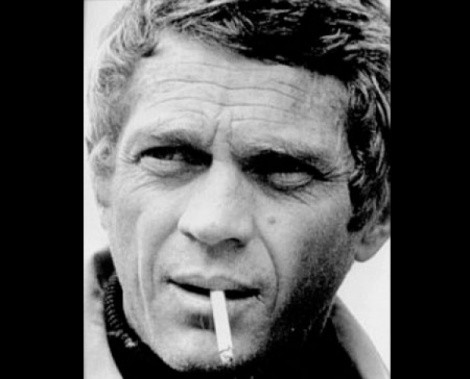
- Steve McQueen
I have a friend named Susan who lives on Cape Cod. In her teens, she taught Caroline Kennedy horseback riding. She became a nurse and raised two sons who went to Harvard. She smoked cigarettes for a long time. Then she quit. Nowadays, she speaks frankly for legions of sometime smokers like me when she says, “If I am diagnosed with a terminal disease, I’m buying a pack of Marlboros.”
When Smoking Cigarettes Was Cool
Both Susan and I started smoking in college. I was an undergrad at the University of Utah when I decided a cigarette conveyed Steve McQueen cool, Jack Kerouac rebellion, on the cheap. A pack of Marlboros cost 35 cents. In seminars in Orson Spencer Hall, we sat in a circle, debated matters of import and smoked cigarettes. Between classes, amid a detritus of coffee cups and ashtrays, bridge players filled the Huddle Room in the Union with a perpetual haze through which the juke box blared The Doors perpetually. At night, we frequented the city’s college bars—La Hacienda, Grogan’s, Crow’s Nest—to drink Olympia beer and smoke cigarettes. My halcyon days! Utah wasn’t exactly Marlboro Country, but the life of a college student was pretty damned good in the late 1960s if for no other reason than a student deferment held the Vietnam draft at bay.
Alas, a degree brought the unwelcome end of my deferment and the beginning of my stint in the Army. As a conscript on a TWA flight to Fort Dix in New Jersey, I chain-smoked apprehensively. But, soon enough, I was socialized into the Army’s tobacco culture. The days were long and boring. “Smoke breaks” provided the only respite. “Smoke ’em if you’ve got ’em,” barked the drill sergeant at regular intervals. We ran for miles in combat boots and smoked the unfiltered cigarettes that came in each package of C-Rations. Later, I attended meetings in which staff officers conferred around large wood tables. Every table held two or three brown-glass ashtrays the size of dinner plates. Most of the officers smoked. Cigarettes were as cheap as candy bars at the commissary.
The Cancer Stick Lost Its Cachet
A few years after my discharge, I kicked a pack-a-day habit. I couldn’t justify the expense or tolerate the persistent cough. At the time, 37 percent of American adults smoked, but as the years passed, smoking lost its cachet. There were lawsuits and advertising constraints, and taxes pushed prices up.
The Marlboro cowboy developed emphysema, and John Wayne died of lung cancer. The percentage of smokers in the United States fell apace. Today, 21 percent of American adults smoke. You don’t see many smokers at the U anymore. All the buildings are “smokefree.” Finding a student who thinks smoking is cool would be difficult, and at $5 a pack, one buys cigarettes with a credit card, not pocket change.
I find it remarkable that in less than 40 years, we have progressed from smoking in airplanes to smoking bans in parks. It is a public-health success story. It is an ongoing story, however, which continues to make headlines.
Now They Want to Triple the Tobacco Tax
State Sen. Allen Christensen, R-North Ogden, is calling for tripling the tax on cigarettes. The U.S. Defense Department is mulling a transition to a tobacco-free military. China is marketing an electronic cigarette that delivers a smokeless hit of nicotine, and John Mellencamp pledges to quit smoking if a million people will join a Facebook group started by his 14-year-old son.
I predict failure across the board. In a war zone, a soldier’s day is a disequilibrium of boredom and terror. Cigarettes offer relief from both. Little wonder that smoking rates are significantly higher in Iraq and Afghanistan than at stateside Army bases. The Pentagon faces an uphill battle convincing guys who spend their days dodging AK-47 rounds and IEDs that smoking is a mortal threat.
The e-cigarette won’t catch on, either.
It satisfies an addict’s need for a nicotine fix but denies the ritualistic pleasure of watching the smoke. Even Steve Jobs couldn’t make this gizmo popular.
Mellencamp has already had one heart attack yet continues to smoke—he’s hooked for life. It won’t make any difference if Keith Richards and a million others sign on to his son’s Facebook group.
Senator Christensen wants to increase revenue and decrease smoking-related illness in one fell swoop. He will fail—not because his logic is faulty but because the Legislature is wary of the slippery slope of “sin tax.” In a state where only one in 10 adults smoke, 56 percent of the population is overweight. Obesity-related illness is increasing like our waistlines and will eventually overtake tobacco’s deadly reign as a leading cause of death in the United States. To put it bluntly, junk food—not nicotine—is the immediate public-health threat in Utah. And everybody knows it, intuitively. Thus, the crusading senator dares not propose a tax on Cokes and Cheetos—not even for the sake of the common good—lest he be pilloried by a mob of righteous, Tea Party chubsters. Instead, he is bent on targeting Utah’s smoking minority, which has no political influence whatsoever.
As a reconstructed nicotine addict, I wish I had never smoked a single cigarette. It is a foolish, expensive habit. Nevertheless, I confess that, like Barack Obama and Laura Bush, I sneak a cigarette every now and then. I am hoping Sienna Miller is on the right track when she says, “I love cigarettes. I think the more positive approach you have to smoking, the less harmful it is.” The politics of smoking is another matter, however.
In that arena, I appreciate even-handedness. I am sympathetic to individual rights, respectful of data, and bone-weary of politicians who trumpet specious justifications for their myopic schemes.
Private Eye is off this week. Respond to John Rasmuson at comments@cityweekly.net.